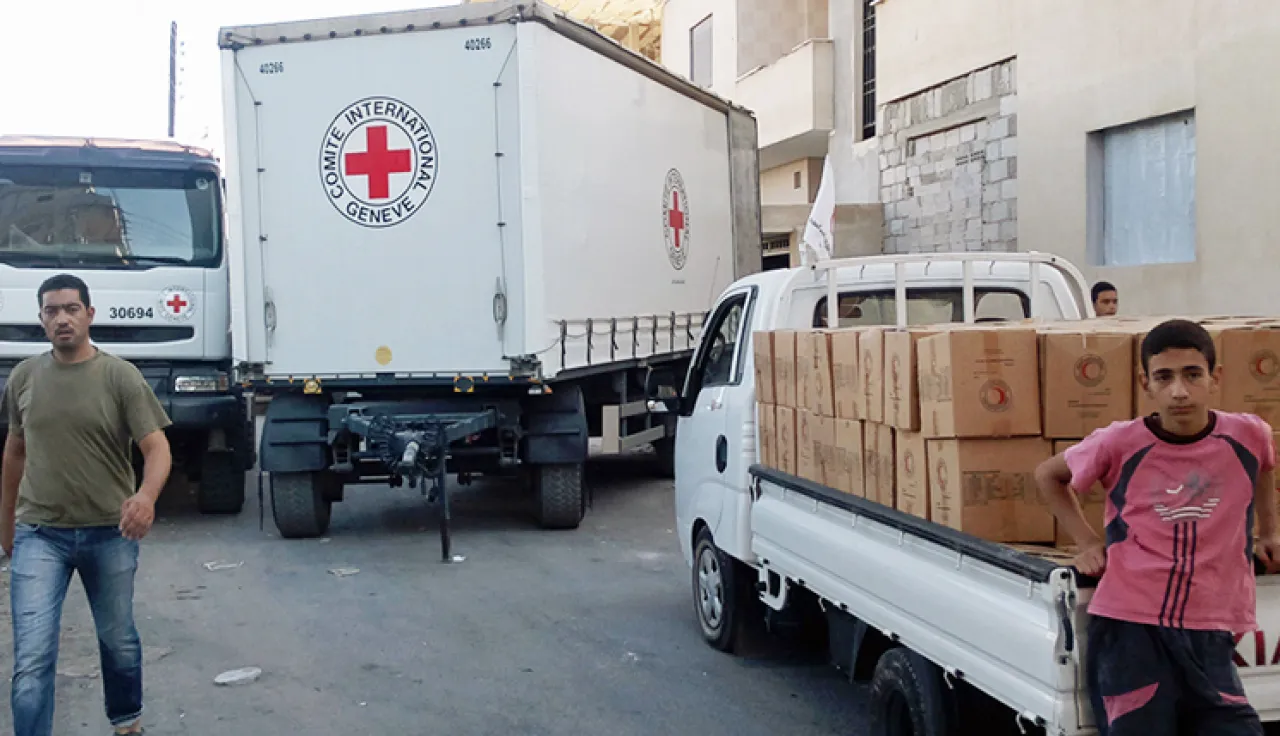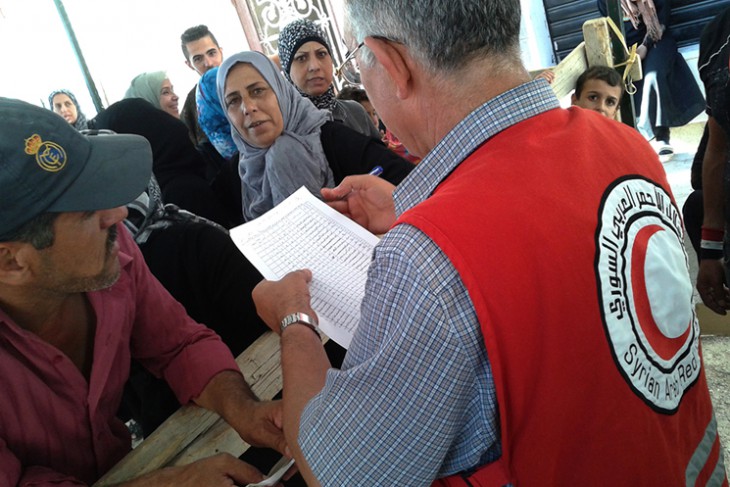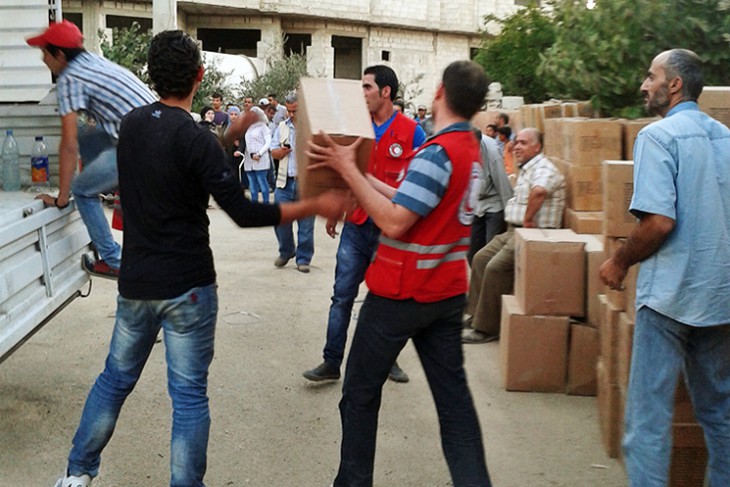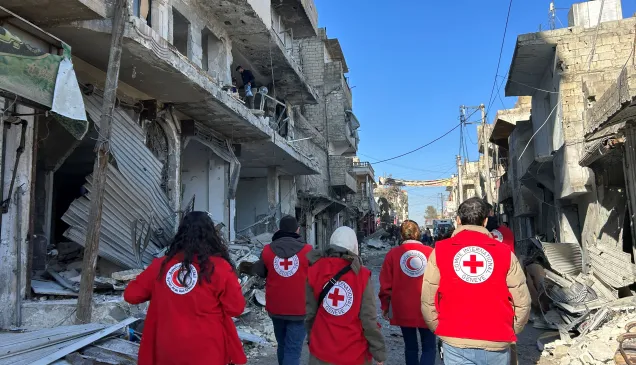Syria: Fighting in Quneitra and Dara'a displaces over 100,000 people

In September, fighting in and around the governorates of Quneitra and Dara'a intensified, displacing over 100,000 people to Damascus and Rural Damascus. Working closely with the Syrian Arab Red Crescent, the ICRC provided food and other relief items for over 510,000 people displaced throughout the country, including emergency relief for over 90,000 people in the south.
"The security situation in Quneitra and Dara'a remains fragile," said Daphnée Maret, the deputy head of the ICRC delegation who coordinates assistance programmes in Syria. "More humanitarian aid is urgently needed as more people flee the fighting."
In Damascus and Rural Damascus, where the majority of the displaced people sought shelter, ICRC and Syrian Arab Red Crescent personnel delivered food parcels, mattresses, blankets, and hygiene items. In Dara'a, they distributed food and other items such as kitchen sets, candles, rechargeable flashlights, towels and water buckets to over 30,000 displaced people.
In addition, ICRC staff and Syrian Arab Red Crescent volunteers delivered a three-month supply of chronic disease medicine in Moadamiya to treat over 5,000 people.

Every month, the ICRC assists tens of thousands of people affected by the conflict living in Syria and neighbouring countries. The organization is striving to step up its humanitarian assistance in both government- and opposition-held areas in order to deliver neutral, impartial, and independent aid to all people suffering the effects of the conflict.
Thanks to its continuous contact with parties to the conflict and with the help of the Syrian Arab Red Crescent, the ICRC managed to deliver food and other relief items to over 510,000 people across the country in September.
Facts and Figures – September 2014
The ICRC is currently working in Damascus, Aleppo and Tartus. Over 300 staff are endeavouring to distribute food, restore the water supply, improve health care and re-establish contact between people separated by the conflict.
Emergency aid
In September, the ICRC:
- supplied food to over 510,000 people (most of them displaced) in 10 governorates: Damascus, Rural Damascus, Suweida, Quneitra, Dara'a, Homs, Hama, Tartus, Lattakia and Aleppo;
- supplied nearly 33,000 people living in shelters in Damascus, Homs, Lattakia and Rural Damascus with daily meals through collective kitchens supported by the Syrian Arab Red Crescent;
- provided over 140,000 other people displaced by the fighting with hygiene items, blankets, mattresses, towels, water buckets, rechargeable flashlights, candles, cooking sets and other essentials.

Water and sanitation
The ICRC worked closely with the Syrian Arab Red Crescent and local water boards to provide sanitation and water network upgrades to:
- 17 shelters in Raqqa governorate accommodating over 1,200 displaced people;
- the university compound shelter in Deir Ezzor housing over 5,000 displaced people;
- shelters in Idlib, Hama city, Al Bureij town in rural Homs and Quneitra together hosting over 700 displaced people.
- In addition, the ICRC and the Syrian Arab Red Crescent provided water purification consumables for use in:
- Al Figeh spring, which supplies water to over four million people in around Damascus;
- Al Hassakeh governorate for over 800,000 people;
- Al Sin water treatment plant, which supplies water to all the inhabitants of Lattakia, including displaced people living in shelters;
- Al Khafseh water treatment plant in Aleppo, which supplies water to both government- and opposition-controlled areas of the city;
- Al Tannour water treatment plant, which is the main water source for Homs and surrounding areas;
- Al Qusair water treatment plant, which is the main water source for the city of Hama and over 42 other towns in both government- and opposition-controlled areas;
- the water purification equipment of the haemodialysis unit of the Al Bir Hospital in Al Waer, for which emergency maintenance and spare parts were also provided.
The ICRC and the Syrian Arab Red Crescent also:
- delivered water by truck for over 100,000 displaced people currently living in Moadamiya, Deir Ezzor, Al Dweir Camp, Arrastan City, Homs City, Al Nabek, and Tal Kurdi;
- provided equipment for the Barada spring, which supplies 20 per cent of the water consumed in the city of Damascus, and for the Dummar pumping station, which provides water for over 30,000 people in Damascus;
- made available generators, pumps, pipes, taps and other supplies to equip two water wells in the opposition-controlled outskirts of Dara'a city, providing an alternative water supply for over 12,000 people;
- delivered generators, pumps, shafts, rings, mechanical seals and pipes to facilities in Talbiseh, Farhaniah Al Sharkiah, and Arrastan to ensure that the water supply would be maintained for thousands of people in Homs;
- dug concrete trenches for electric cables at the Alouk water station in Al Hassakeh serving over 800,000 people;
- provided a generator and other equipment for the Aziziya water station in Al Hassakeh, which supplies water to over 800,000 people;
- maintained Aleppo city's water network, which supplies water to hundreds of thousands of people living in government- and opposition-controlled areas of the city;
- carried out upgrades to the pumping equipment in two water wells at Al Razi Hospital and Ahl Kahef in Aleppo, which serve as alternative water sources for the people in the city;
- carried out repairs in Aleppo to the Suleiman Al Halabi water station and water facilities in Jabal Al Westani, Kafr Naha, Kafr Noran, Kafr Tal, Afrin, Hermesh, Ma'arat Artiq, Anadan, and Nubul.
Health
The ICRC worked closely with the Syrian Arab Red Crescent to provide:
- supplies and financial support for nine Syrian Arab Red Crescent mobile health clinics and one outpatient care facility in Rural Damascus, Aleppo, Idlib, Hama, Homs, Deir Ezzor, and Tartus, which together have the capacity to provide primary health care for over 7,000 patients every month;
- chronic disease medicine for over 5,000 people in Moadamiya, Rural Damascus.
Restoring contact between family members
The ICRC delegation in Damascus:
- issued travel documents to five Iraqi refugees to facilitate their resettlement in a European country;
- received 161 tracing requests from people seeking to locate their relatives;
- succeeded in tracing a five-year-old Syrian child in Greece with the cooperation of the ICRC office in that country;
- distributed eight Red Cross messages (containing family news only) and 14 salamats (oral messages to family members), mainly from Syrians abroad.
For further information, please contact:
Ralph El Hage, ICRC Damascus, +963 930 336 718
Nadia Dibsy, ICRC Geneva, tel. +41 22 730 37 23 or +41 79 447 37 26



